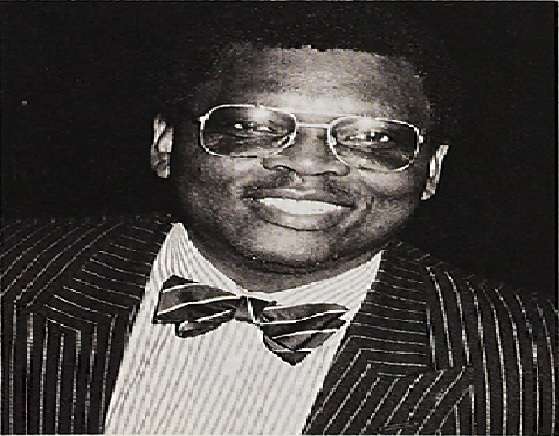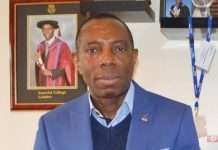
“Innovative thinker and scholar, Justus Akinsanya was a leading figure in nursing. His method of bio-nursing promoted a new biological approach to treatment, challenging widely accepted practice. Throughout his career in Britain and Nigeria, Justus made history as the first black member of the National Board for Nursing, Midwifery and Health Visiting.”
(Suffolk & North East Essex Integrated Care System, UK)
Arguably one of the most influential health professionals in recent history, Professor Justus Akinbayo Akinsanya was a nurse leader, researcher, and administrator ahead of his time. From the moment he began to practice – both in Britain and later in Nigeria – he purposely set out to transform the dominant approach to the nursing profession in his time, an approach he considered to be limiting the capabilities of the practitioners. This ultimately led to the birth of his innovative “bio-nursing” principle, which prioritizes and promotes the biological approach to treating patients.
It must be noted that before Akinsanya’s trailblazing model, nursing education and practice had, for many years, highlighted the “compassion” and “caring” aspects of nursing and the behavioral aspects of nursing roles. Akinsanya, however, observed that the paucity of focus on the biological sciences led to a critical imbalance in nursing knowledge, thereby hindering nurses from practicing safely and optimally. He was particularly concerned about the number of adverse patient outcomes he observed, which he felt were avoidable.
Akinsanya was of the view that for nurses to be autonomous practitioners, delivering nurse-led services and undertaking independent prescribing in practice environments that are dynamic, unpredictable, and reactive, they required a range of knowledge types to inform clinical decision-making and deliver holistic care. Top on the list of what must be done, according to him, was a greater infusion of the biosciences in nursing practice and education. He was particularly keen on reminding nurses who had gradually misconstrued their practice to be more of social and behavioral science, that the biological sciences are the backbone of their work.
Essentially, bio-nursing, according to Akinsanya, is clinical nursing that uses, in theory, and practice, the principles of natural sciences such as Biology. In his words: “For years, textbooks of Anatomy and Physiology for nurses – my own included – have started from the skeleton, then described the systems, ending with the nervous system. But in the bio-nursing approach, you start with the nervous system because that is what controls the rest.”
This innovative approach, best known as the Akinsanya model of bio-nursing, has become rapidly popular, and presently forms a part of nurse training programs in many countries around the world. So transformative were Akinsanya’s contributions to nursing education and practice that he was at different times acclaimed to be “Britain’s best known black nurse”, and a “seminal force in nurse education.”
A publication of the NHS, UK, said of the erudite nurse: “Professor Akinsanya’s contribution to nursing education is nothing short of pioneering. From his beginnings as a black male nurse in a female-dominated profession to his ground-breaking concept of bio-nursing and his prolific academic career, his considerable influence can still be felt in the healthcare field today.”
Road to impact
Akinsanya was born on 31 December, 1936, in Okun-Owa, Ijebu, Ogun State. He was the youngest child of Prince Isaac Akinsanya and Chief Susanah Adefowoke. He had his early education in Nigeria before traveling to the UK. His initial intention was to study Economics, but he later changed his mind and instead registered as a student fever nurse at Abergele Sanatorium in North Wales. He later completed his nursing training at Crumpsall Hospital, Manchester.
In 1960, he qualified in general nursing, specializing in tuberculosis cases. In 1967, he did courses in orthopedic, dermatological, and psychiatric nursing and qualified as a sister tutor. He was advised to become a nurse teacher, and after completing his A-Levels, he went on to obtain BSc Honours in Human Biology from the University of London. On graduation, however, he found that no hospital wanted to employ a graduate tutor. Peggy Nuttall, then editor of the Nursing Times, convinced him to write an article, “Tutors Wanted: Graduates Need not Apply”. The article gained widespread attention and he was subsequently offered employment as to tutor at Kings College Hospital in London.
In 1975, Akinsanya decided to return to Nigeria to render much-needed nursing education services to his fatherland. Soon after his arrival, he was recruited by the Nigerian Nursing Council for different strategic positions (deputy secretary/registrar (education), 1975-1976; acting secretary/registrar, 1977-1978). He subsequently lectured at the Institute of Management and Technology, Enugu, from 1976 to 1977. He also served as editor of the West African Journal of Nursing.
Ground-breaking research
It is noteworthy that Akinsanya spent his years of service in Nigeria shaping nurse-training programs to meet the needs of the various communities in the country and throughout West Africa. He later returned to the UK, where he embarked on a Ph.D. program at the Faculty of Science, University of London. It was in the completion of the program in 1984 that he produced the landmark thesis that would revolutionize the practice of Nursing. It was titled “Knowledge of the life sciences as a basis for practice: some problems in nurse education.” This was eventually published as “Knowledge of the Life Sciences as a Basis for Practice.” He introduced and elucidated the concept of bio-nursing in the publication.
The impact of the publication was so seismic that in 1985, he became one of the early professors of Nursing at the Dorset Institute of Higher Education, now Bournemouth University. He was the first black person to occupy the position. Four years later, he became the academic dean of the Faculty of Health and Social Work at Anglia Polytechnic University. Years later, he was made the pro-chancellor of the institution.
Throughout his career, Adesanya attended conferences and taught and mentored all over the world. Indeed, as an expert on the UK’s NHS once wrote, he is “remembered by his peers as a motivated and endlessly cheerful family man, with a penchant for bow ties. Throughout the world, his reputation as a human biologist, nurse educator, and researcher is well-known through his writings in numerous journals and publications.”
Awards and recognitions
Following the wide acclaim that greeted his thesis publication and subsequent research efforts, Adesanya was awarded the Fellowship of the Royal College of Nursing (FRCN) in May 1988. That same year, he was appointed to the English National Board for Nursing, Midwifery and Health Visiting 1988. The Board had the legal responsibility for approving institutions in England where professional nursing and allied courses were provided. Adesanya was the first black nurse to ever assume the position.
Akinsanya died in August 2005, leaving behind a wife and three children. In his honor, the Research Society of the Royal College of Nursing (RCN), UK, instituted the Akinsanya Award for Innovation in Doctoral Studies in Nursing. It is an innovative nurse research prize that involves UK-wide competition across all nursing disciplines. His family also started the Justus Akinsanya Fund for Education Advancement (JAFEA) to celebrate outstanding improvement, achievement in education, and professional development, and to commemorate Akinsanya’s indelible legacies.
Writing on the Akinsanya Award, which is awarded as a scholarship, Professor Veronica Bishop, founding editor, Journal of Research in Nursing, said: “Justus Akinsanya (whom I knew well) was an extraordinary man. Full of energy, recognizing exciting opportunities and creating new ones, he achieved both academic and political “clout”. To continue his name through the annual Justus Akinsanya scholarship, managed through the Journal of Research in Nursing, is in keeping with a key aim of the journal – to promote excellence in patient care and to encourage research-based practice.”













